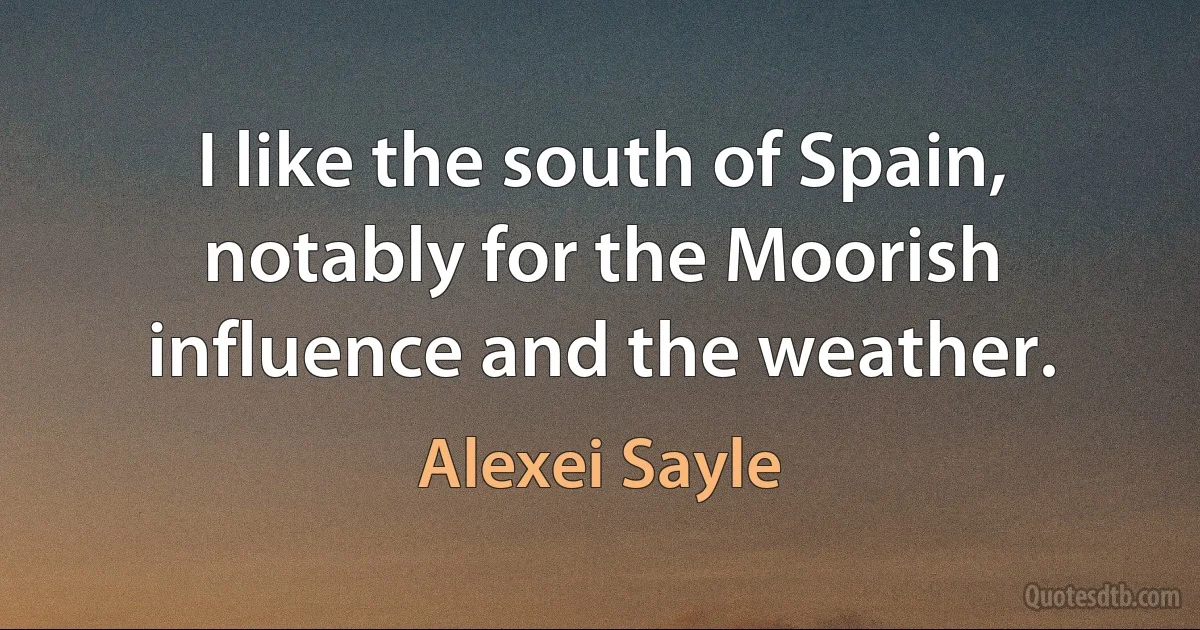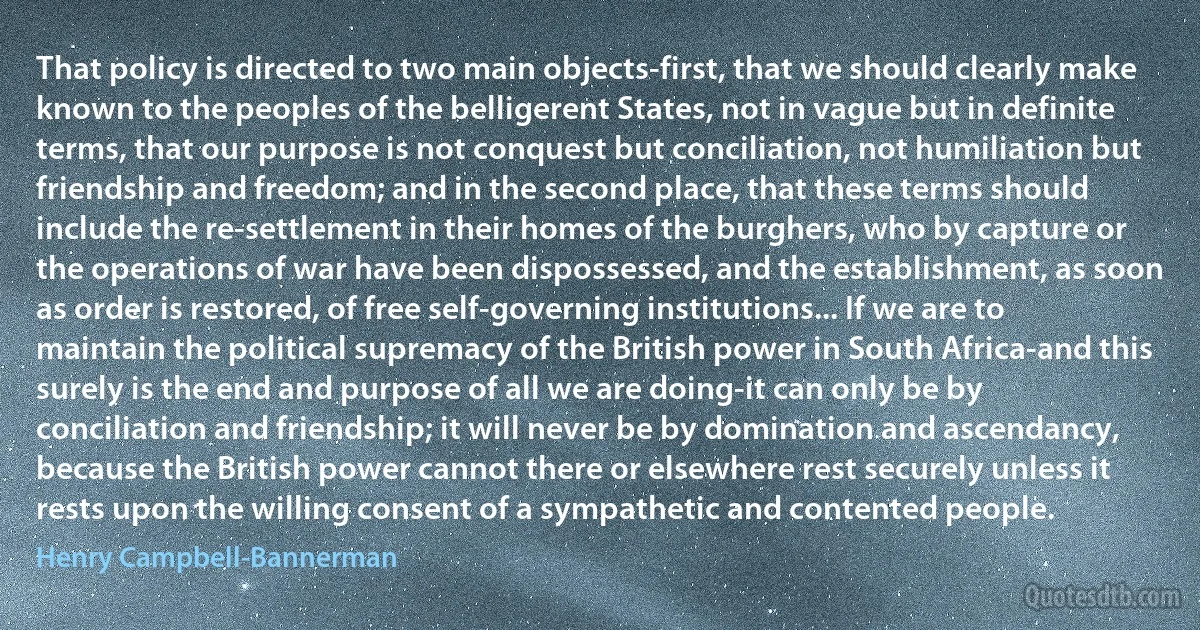South Quotes - page 68
The people of Vietnam, north and south, seek the same things, the shared needs of man, the needs for food and shelter and education-the chance to build and work and till the soil, free from the arbitrary horrors of battle, the desire to walk in the dignity of those who master their own destiny. For many painful years, in war and revolution and infrequent peace, they have struggled to fulfill those needs. It is a crime against mankind that so much courage, and so much will, and so many dreams, must be flung on the fires of war and death. To all of those caught up in this conflict we therefore say again tonight, 'Let us choose peace, and with it the wondrous works of peace, and beyond that, the time when hope reaches toward consummation, and life is the servant of life'. In this work, we plan to discharge our duty to the people whom we serve. This is the State of the Union. But over it all-wealth, and promise, and expectation-lies our troubling awareness of American men at war tonight.

Lyndon B. Johnson
Spain stooped on South America, like a vulture on its prey. Every thing was force. Territories were acquired by fire and sword. Cities were destroyed by fire and sword. Hundreds of thousands of human beings fell by fire and sword. Even conversion to Christianity was attempted by fire and sword.

Daniel Webster
Could I ask my friend if he recalls the recent testimony by Henry Kissinger, probably the most highly regarded individual in America today? He voiced his concern. His fundamental problem was that, as he put it, we have gone from negotiations to rid Iran from ever having the capability of developing nuclear weapons to delaying it. So that on its face--and again, I want to remind my friend from South Carolina that he and I and our beloved friend, former Member of this body, Joe Lieberman, made visit after visit to Baghdad and to Iraq. We probably were everywhere in that country on many occasions. And how well we remember the fight the surge brought on to bring stability to Iraq. It did bring stability. You remember the battle of Sadr City. Who was it that our forces, our young men and women, were fighting against, the Badr Brigades? Guess who is fighting in Tikrit today. The Badr Brigades.

John McCain
I spend a lot of time with the men and women who are serving in the military, including members of my own family, and they are not uninformed. They are very intelligent. They watch what we do--we, their elected representatives. Their voters trust us to defend them, care for them, to give them the weapons they need, the benefits they need, and the care they need when the wounded come back. They rely on us. They are going to see, as we watch Vladimir Putin on the march, as we watch the success of ISIS, as we watch Ukraine being dismembered, as we watch China commit more aggression in the South China Sea and fill in islands--and now? Now this Commander in Chief decides that this is a time to veto an authorization bill because he doesn't think there is enough domestic spending. It is a sad day, a very sad day. It is a sad day for America but most of all it is a very sad day for the men and women with whom we entrust our very lives and our security. It is a sad day.

John McCain
Mr. President, briefly, the Senator from South Carolina and I discussed this announcement that Russia will begin withdrawing some military forces from Syria. It obviously signals Vladimir Putin's belief that he has bombed and killed enough of the opponents of the murderous Assad regime to assure Assad's survival. For 4 years, this administration--this President--stood by as the Assad regime slaughtered nearly half a million people in Syria. Then, when Assad appeared weak, it watched as Putin intervened militarily and protected his brutal regime, in a move that the President described as Putin going into a "quagmire." Well, apparently now Vladimir Putin is leaving that "quagmire," and he is leaving a solid Bashar Assad in a position of strength. He is leaving thousands of dead moderate opposition that he has indiscriminately bombed, and the United States has their begging bowl out, asking and pleading that they somehow reach some agreement again in Geneva.

John McCain
To my mind, the dominant point of the situation is not South Africa, where we can and must win, but the critical and dangerous state of our position in Europe. I believe the Opposition can do inestimable service to the country in producing a better state of things relatively to Europe. But, to bring that about, it is absolutely essential that we should dissociate ourselves from the Raid and Chamberlainism.

Henry Campbell-Bannerman
Aryabhata is acknowledged as one of the astute astronomers of early India. His school of astronomy is well known and widespread all over India, especially in the South...Of late there is a tendency to spell his name as "Aryabhatta”. While Aryabhata himself mentions Kali 3600 to be the date of his composing the work, some say that Kali 3600 is the date of his birth. A view has been broached that Aryabhata hailed from Kerala.

Aryabhata
John Baldwin was Examined before the Reconstruction Committee - He was asked if Jeff Davis could be tried before a Jury in the South & convicted of Treason. He replied - Yes - that Mr. Davis (& himself) had been guilty of treason & if they were tried for it he saw no reason why they shouldn't be convicted. Tell Hugh (for me) that the difference between me & him is that I committed Treason & am proud of it - he committed Treason & is ashamed of it. Baldwin's testimony was in 1867. Dick Smith in [struck: the] an Editorial [inserted: in the Enquirer] was very severe on him [struck: on him]: Baldwin replied in a letter. If Sam Yost has files of his paper no doubt you can find it.

John S. Mosby
Like a dropsical man calling out for water, water, our deluded citizens are clamoring for more banks, more banks. The American mind is now in that state of fever which the world has so often seen in the history of other nations. We are under the bank bubble, as England was under the South Sea bubble, France under the Mississippi bubble, and as every nation is liable to be, under whatever bubble, design, or delusion may puff up in moments when off their guard. We are now taught to believe that legerdemain tricks upon paper can produce as solid wealth as hard labor in the earth. It is vain for common sense to urge that nothing can produce nothing; that it is an idle dream to believe in a philosopher's stone which is to turn everything into gold, and to redeem man from the original sentence of his Maker, "in the sweat of his brow shall he eat his bread.”.

Thomas Jefferson
No matter how hard the enemy tried to take Tula and thus open the road to Mosocw from the south, he was unable to do so in the course of November. The city held out like an invulnerable fortress. Tula tied down the entire right flank of the German forces. When the enemy ultimately decided to by-pass Tula, Guderian's army was forced to split its forces, losing the operational effectiveness provided by tactical concentration. That is why Tula and its citizens played such an outstanding role in the defense of Moscow.
Tula, ancient city of Russian gunmakers, thus became an unconquerable outpost of the capital thanks to the solidarity and self-sacrifice of its citizens, who fought with or helped our soldiers in every possible way. I don't think I would be far wrong if I said that the glory given to Moscow as a hero city belongs also to Tula and its people.

Georgy Zhukov
How do you feel about amnesty for illegals? We know most of you oppose it, because you're sane taxpayers, and you love your country. The path to citizenship runs south. You want a path to citizenship? It runs south. Back to where you came from. And then get on line and come here legally, like everyone else, like my father and my grandfather. The quotas have not changed. For every illegal that is granted amnesty some other poor soul who was waiting on line gets pushed off the line...

Michael Savage
I say to the honest Americans that if such a thing happens, do not capitulate, do not give in. You have to defend your country, defend your family and your honor. Do not commit aggression against us. And, as you know, we didn't commit agression against America, America is the one who dearly killing our children, our women, as I am talking to you there are American planes in south and the north dropping their bombs on the citizens and on their properties, this happens daily! if there is a law in world says that the stronger one gets their way it means surrender to "the law of the jungle"! and we do not surrender to "the law of the jungle." It is our duty to defend our country, so we will not to surrender not to America, not to anybody else.

Saddam Hussein
This is a quality that has appeared often enough in American history - and outside America as well. Senators like Ted Kennedy have been prominent before, bearing names like Henry Clay or Daniel Webster, John C. Calhoun, Robert Taft, Barry Goldwater and Hubert Humphrey. Governors like New York Republican Nelson Rockefeller or Alabama Democrat George Wallace. A Congressman like Jack Kemp. Non-office holders like Martin Luther King in the United States or Mohandas Gandhi in India or Nelson Mandela in South Africa (who later became president of his country) can, through sheer force of personality, come to dominate the political scene of the day without ever bearing a single official title.

Ted Kennedy
The north and the west and the south are good hunting ground, but it is forbidden to go east. It is forbidden to go to any of the Dead Places except to search for metal and then he who touches the metal must be a priest or the son of a priest. Afterwards, both the man and the metal must be purified. These are the rules and the laws; they are well made. It is forbidden to cross the great river and look upon the place that was the Place of the Gods - this is most strictly forbidden. We do not even say its name though we know its name. It is there that spirits live, and demons - it is there that there are the ashes of the Great Burning. These things are forbidden - they have been forbidden since the beginning of time.

Stephen Vincent Benét
Ilyas Shah of Bengal (1339-1379 AD) invaded Nepal and destroyed the temple of Svayambhunath at Kathmandu. He also invaded Orissa, demolished many temples, and plundered many places. The Bahmani sultans of Gulbarga and Bidar considered it meritorious to kill a hundred thousand Hindu men, women, and children every year. They demolished and desecrated temples all over South India.

Sita Ram Goel
Political self-government, central and local, was an English invention, imported into Scotland by the Grey Ministry, but intensely popular in spite of its foreign origin. Although in temper, creed and outlook on life the Scottish people were less submissive than the English, the civil institutions of their country contained in 1830 no elements of popular election such as always existed here and there in the south of the island. There was no safety-valve for all that pent energy. The Reform Bill, in England an evolution, in Scotland was a revolution, veiled in form of law, and the passions aroused over it had been proportionately more fierce.

G. M. Trevelyan
These people call themselves "right to lifers." Don't you love that phrase? And don't you love the way these kind of people pervert the English language? You realize that most of the right-to-lifers are in favor of the DEATH penalty? And they support the South American DEATH squads. And they're against gun control and they're against nuclear weapons control. When they say "right to life," they're talking about THEIR right to decide which people should live or die. Doesn't it strike you as mildly ironic that most of the people who are against abortion are people you wouldn't want to fuck in the first place?

George Carlin
For my own part, and speaking according to my limited vision, I do not believe those efforts of the Federals will be successful. No man can say that the North will subdue the South; but no man can say that the war is finally over, or that the independence of the Southern States is established....in this state of affairs I should say, that looking to the question of right, it would not be a friendly act towards the United States, it would not be to fulfil our obligations to a country with which we have long maintained relations of peace and amity-a great country which says it can still carry on the war-it would, I say, be a failure of friendship on our part if at this moment we were to interpose and recognise the Southern States.

John Russell, 1st Earl Russell



